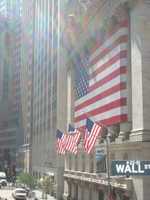| Home | About | Archives | RSS Feed |

The Independent Investor: Good Friday and the Stock Market
 |
This Friday the stock and bond markets will be closed to commemorate the crucifixion of Jesus Christ, or so the theory goes. But that is just one of the many myths involved in this holiday and its origins remain a mystery.
The fact that the New York Stock Exchange (NYSE) has a tradition of closing on Good Friday, one of nine holidays per year, has many traders and investors scratching their heads. After all, it is not a federal holiday and plenty of other businesses are open on that day. What makes Good Friday any more important than say, Columbus Day?
There is a story that during the 1890s there were three years in a row that the market suffered big drops on Good Friday. Superstitious traders took this to be a sign from God that "Thou shalt not trade on Good Friday." There is no evidence that is true. The Exchange was open for trading during Good Friday on three separate years (1898, 1906 and 1907). However, when the exchange did open for business in those years, the market was up two of those three Good Friday dates.
Another fable that many believe was that the market suffered through a Black Friday market crash in 1869. As a result, the Board of Governors of the Exchange swore never to open again on Good Friday. That seems a little hard to believe, since records indicate the exchange was closing on Good Friday as far back as 1864.
Art Cashin, the renowned trader at UBS, says there never was a stock market crash in 1869 but there was a crash in the gold markets back in September of that year. Easter week, however, is in April, not September, so go figure.
Although Good Friday is not a federal holiday, many states do recognize it as a state holiday with local governments, banks and other institutions closed this Friday. As a result, trading volumes are smaller, since fewer potential players are at work. Businesses that normally stay open on Easter Sunday also tend to close on Good Friday so that their employees get a day off to compensate for working on Sunday.
Some think that the holiday was a nod to Jewish and Christian traders looking for a day off between Passover and Easter. Globally that makes some sense since already anemic trading volumes are even lower because Europe traditionally closes for Easter week. But as the original reason for this NYSE holiday, it does not square. Daily global trading is a relatively recent phenomenon on the stock exchanges.
There is some reason to believe that religion did play a role in the holiday. New York, a century ago, was the home of Irish immigrants. As such there was a preponderance of Irish Catholic officials in just about every walk of life in the city, including the NYSE. It is plausible that those officials could have lobbied for the closing of markets during this important Catholic holiday. But no one can prove it.
So the origins of this stock exchange holiday remain mired in mystery. It is just one of the many quirky twists that amused and confuse Wall Street on slow holiday weeks. Whatever the reason, Friday is a day off for me, but never fear; I'll still be writing your market column as usual.
Bill Schmick is registered as an investment adviser representative with Berkshire Money Management. Bill’s forecasts and opinions are purely his own. None of the information presented here should be construed as an endorsement of BMM or a solicitation to become a client of BMM. Direct inquires to Bill at 1-888-232-6072 (toll free) or email him at Bill@afewdollarsmore.com.

